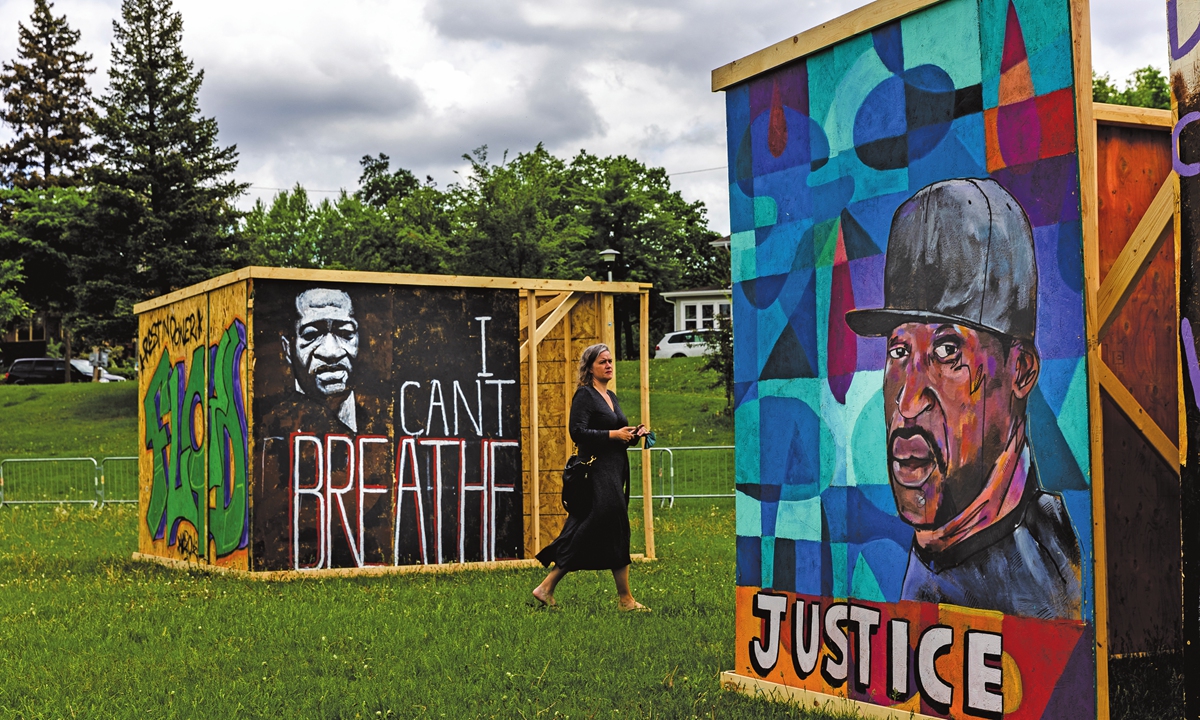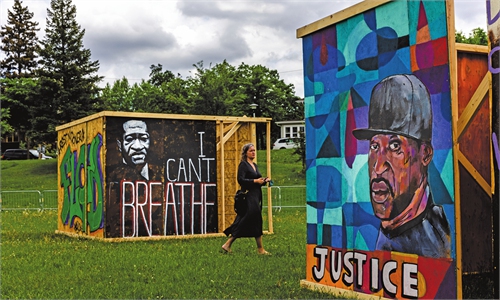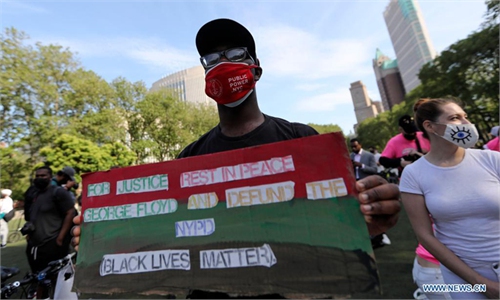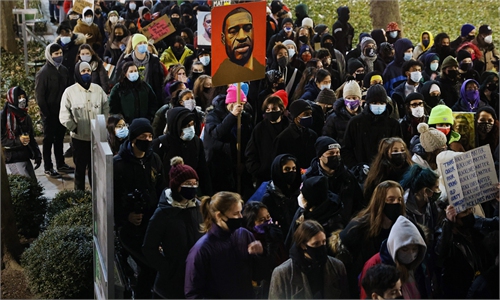
A visitor attends the free public art exhibit Justice for George: Messages from the People at Phelps Field Park near George Floyd Memorial Square in Minneapolis, Minnesota, the US. Photo: AFP
May 25 marks the first anniversary of George Floyd's murder. A long and painful year passed, yet what has and has not changed in the US?The unprecedented mass protests Black Lives Matter last year have driven the Biden administration to pledge to overhaul American policing laws. To make a gesture, President Biden called on the Congress to pass a major police reform bill ahead of this year's anniversary. While congressional negotiations are still in the process and far from yielding any concrete results, the Floyd tragedy keeps repeating itself across the nation. Lindani Myeni's death last month, for instance, has triggered the outrage of another country.
On April 14, Myeni, a 29-year-old South African rugby player, was shot and killed by the police in Hawaii, leaving his American wife and two children with no one to care for them. The case, though failing to make much national news in the US, touched a special nerve in Myeni's home country. Yet his murder again reveals systemic and deeply rooted racism in the US.
To cater for his American wife's career, Myeni settled in Honolulu in January 2020 after having a hard time spotting a race-friendly neighborhood for his two children. Yet still, even before his death, he had already felt targeted by local police as he had been arrested at a nightclub at one time and stopped for inquiry while walking to the rugby practice at another.
"Silence is complicity," noted President Biden on May 20 when signing a bill addressing hate crimes against Asian Americans. Ironically, nearly all American media outlets have remained silent on Myeni's death. However, South African people demand justice for Myeni as the case is just too reminiscent of their apartheid legacy. Demonstrations have assembled in front of the US Embassy in South Africa. And cries for justice are gaining momentum on social media.
"How would I raise my son in that community knowing that he will be a strong black man as well, and that they fear strong black men?" remarked Myeni's widowed wife. She has decided to stay in South Africa and seeks to obtain South African citizenship for the safety of her children. Her own motherland now only reminds her of her agonizing loss and deeply buried fears.
Why does police brutality so frequently occur in the US then?
On the one hand, racist traditions were deeply intertwined in the initial establishment of American police system. In the early founding days of the country, police were "slave patrols" whose obligations included hunting run-away African slaves and suppressing labor insurrections. From the very beginning, US police served as a tool for slave owners to institutionalize racially a segregated social order and impose racially biased laws. The slave economy and social turmoil caused by forced labor gave rise to the creation the first version of US policing. In this sense, racial discrimination has long been genetically embedded in the American police system.
Today, African Americans are still disproportionately subject to police violence nationwide. African Americans account for only 13 percent of the US population, yet make up 57 percent of police search cases. At least 28 percent of all victims shot dead by police in 2020 were black, recorded the Mapping Police Violence database. The likelihood of black Americans being killed by police is three times higher than the white.
On the other hand, it is extremely hard to press charges against officers involved in violence. Among the over 98 percent fatal police shootings from 2013 to 2020, officers were not charged with any crime - only a few were convicted, as indicated by the Mapping Police Violence database. Moreover, US ambiguous regulations for an officer's possession and use of firearms further complicate the issue.
Besides, backed by colleague's testimony in the court, prosecuted officers tend to gain favorable impression from the jury. The conviction of officer Derek Chauvin, the culprit of Floyd's death, is a rare success of the victim propelled by public rage and worldwide protests. Many more unknown "Floyds" out there are still uncounted for. High-profile promises, plus symbolic measures, have become a trump card for the US government as it is fully aware that the racial conundrum can never be solved within any single administration's term.
While Biden resorted to personal connections by holding Floyd's family at the White House on Tuesday, his administration is downplaying the political goals once articulated loud and clear. They have been pretty experienced in this regard and will continue to do so until the next Floyd case surfaces.
The author is a current affairs commentator. opinion@globaltimes.com.cn



